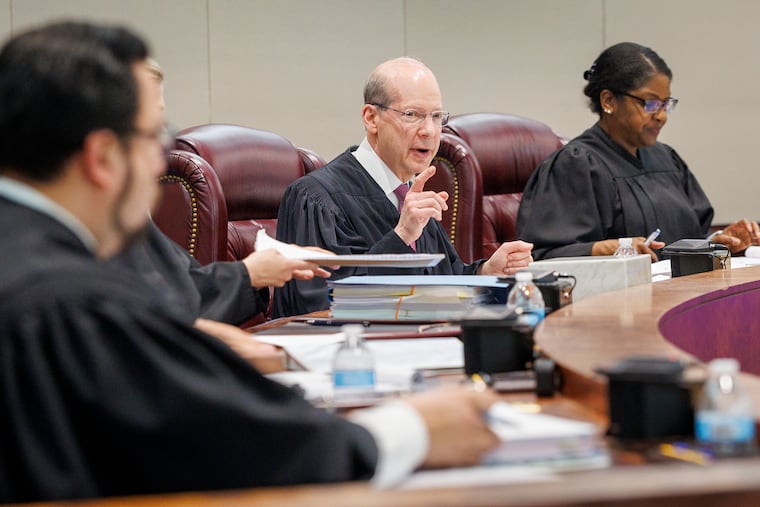The N.J. Supreme Court will decide whether to allow a grand jury investigation into statewide clergy abuse
A judge blocked the probe from moving forward after the Camden Diocese challenged it in court. The attorney general's office has appealed.

The New Jersey Attorney General’s Office told the state Supreme Court on Monday that a state judge acted prematurely two years ago when he sided with attorneys for the Camden Diocese and barred prosecutors from impaneling a grand jury to investigate decades of sexual abuse by Catholic priests.
But during an hourslong hearing in Trenton, an attorney for the diocese told the justices that he believed the probe was properly short-circuited. New Jersey law permits prosecutors to produce only grand jury reports about government officials or agencies, attorney Lloyd Levinson argued before the court — and any attempt by prosecutors to target private institutions should not be allowed to move forward.
“I believe private entities are off-limits,” he said.
The arguments came as the state’s seven justices begin to weigh the contentious and once-secret case between the attorney general’s office and Camden’s diocese, which serves nearly half a million Catholics in South Jersey.
Prosecutors in 2018 said they wanted to conduct a sprawling investigation into decades of clergy abuse across the state, and as part of the probe, they said they would release a report detailing incidents of abuse over the years and suggesting reforms — just as the Pennsylvania Attorney General’s Office had done around the same time.
But in 2021, Camden’s diocese filed a sealed motion saying grand jury reports in New Jersey must target misconduct by government agencies or officials. And any attempts to single out the church, lawyers said, were not permitted under state law.
Two years later, Mercer County Superior Court Judge Peter Warshaw sided with the church during a secret hearing. He also then went a step further and blocked prosecutors from impaneling a special grand jury at all, ruling that it would be a waste of time and resources if the intended outcome was not legally permitted.
An appellate court later affirmed Warhsaw’s ruling. Prosecutors appealed both decisions.
Last month, when the Supreme Court agreed to hear the case, it unsealed hundreds of pages of documents that had remained under seal during the yearslong legal fight. And when the role of the Camden Diocese was revealed, it outraged some clergy abuse victims.
The diocese has a long and troubled history with abuse — in 2020, it declared bankruptcy over a wave of sex abuse lawsuits and ultimately agreed to pay about 300 complainants $87.5 million.
During Monday’s hearing, Deputy Solicitor General Michael Zuckerman — speaking for the attorney general’s office — told the justices that Warshaw’s ruling was perhaps the only example in state history of a judge quashing a grand jury report by preventing a panel from assembling in the first place.
Zuckerman called the decision “hopelessly premature,” saying that grand jury investigations often lead to unexpected outcomes, and that blocking a probe before a report had even been written was improper.
If a report is ever produced, Zuckerman added, a judge could ultimately redact portions of it, limit what gets released, or even prevent it from being made public — rather than blocking the investigation at its outset.
“Nobody knows what the result is here,” Zuckerman said. “This is all highly speculative.”
Several justices seemed interested in that argument, repeatedly asking questions about how they could evaluate the legality of a report that does not exist.
“We don’t know where this grand jury will end as its investigation evolves,” Chief Justice Stuart Rabner said at one point.
Later, Associate Justice Anne M. Patterson asked: “How can anyone on either side of this ask this court to make a ruling in the absence of [a report]?”
Levinson, the diocese’s attorney, said the timing of Warshaw’s ruling was not the issue. The key point, in his view, was that state law does not permit prosecutors to seek grand jury reports against private institutions that include details about crimes they can’t or won’t charge.
To allow prosecutors to do so, Levinson added, would establish a precedent in which law enforcement could target religious entities or private companies with investigations centered around allegations that could not be prosecuted because of the statute of limitations or questions about evidence.
“It is a slippery slope that you don’t want to go down,” Levinson told the court.
Several victims of clergy abuse attended the proceedings, including Mark Crawford, the New Jersey director for Survivors Network of those Abused by Priests. He said the investigation should be allowed to proceed because it is a “matter of public interest.”
How or when the justices will rule was unclear. The court could take several months to issue its decision.